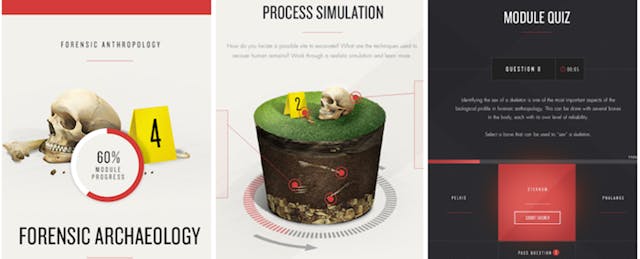Aspiring secret agents will soon be able to get a head start on their training.
London-based startup Forensic Outreach has launched a Kickstarter campaign to raise $150,000 for “CASE Academy: The School for CSIs and Special Agents.” With successful fundraising, the site will offer forensic-focused courses for students in grades 6-12, covering material from crime scene investigation to ballistics and criminal psychology, with lectures developed and presented by forensic pathology experts and former FBI agents. The site is slated for release in February 2016.
“We all have a morbid fascination with crime scenes,” Kimberlee Sue Moran, founder of Forensic Outreach, told EdSurge. “It ties into basic human nature: We like puzzles, we like to figure things out. This is an imaginative way to teach the basic fundamentals of science.”
CASE Academy plans to offer resources beyond online lectures. According to Shivani Lamba, the program’s director, the site will also offer lesson plans, classroom activities, quizzes, online certificates and virtual simulations of an autopsy room or trace laboratory.
“Security science and forensics are glamorized in popular media, and can serve as an excellent conduit to inspire students to pursue STEM careers,” explained Lamba. As she sees it, CASE Academy can make science units exciting by relating them to pop culture, like CSI or Serial. (Forensic Outreach served as a consultant on the eleventh episode of the podcast phenomenon this fall.) She explains, “We can teach physics by looking at the trajectory of a bullet, or anatomy and human physiology through forensic pathology.”
The lessons aren’t make-believe or roleplay; Forensic Science has enlisted educators with unusual backgrounds. Dr. William Tobin, former FBI special agent and Chief FBI Forensic Metallurgist, will contribute to several units involving metallurgy. Tobin served as an FBI agent under J. Edgar Hoover, the first director of the FBI, in the 1970s, after serving as a combat platoon commander in the US Marine Corps and working as a nuclear research metallurgist.
As Tobin sees it, educating young people about forensics isn’t just a way to get them interested in science--it’s also essential for developing informed citizens.
“Educating younger adults reduces the difficulty of turning around a battleship in a bathtub,” Tobin told EdSurge. “Forensic practices have been imbued with false beliefs and fallacies for over a hundred years--the longer false beliefs and fallacies are held, the more difficult it is to correct them.” Tobin hopes that CASE Academy will help correct the general public's misconceptions about forensic science, like theories of how to identify arson from a fire, often learned from TV shows and popular culture. As he envisions it, engaging modules about forensic science could lead to educated students who become “a more informed judiciary and juries,” reducing “risks of forensic error, poor judicial rulings and wrongful convictions.”
Thomas Mauriello, former special agent and Chief of Polygraph at the US Department of Defense, agrees. Mauriello, who teaches a Crime Laboratory course at the University of Maryland and posts a show about forensics online, will contribute to CASE Academy’s modules about polygraphs and crime scene investigation. He sees the site as having the potential to take advantage of the fascination sparked by shows like CSI and Law & Order, while also educating the viewer.
“We can thank OJ Simpson for that interest in forensics,” Mauriello explained. “When CSI began, shortly after the trial, I was excited. As a forensics professor, I thought, oh wow, I’ll be able to use this to engage students in discussion.” But Mauriello was soon disappointed with the focus on drama rather than factual science.
“Even shows like Forensic Files and documentaries for the Discovery Channel--Hollywood makes it very clear that their interest is to entertain, not to educate,” said Mauriello. “When people become jurors, they watch these shows and truly believe they’re being educated about the [justice] system.” He hopes that CASE Academy will make use of the public’s interest in forensics to better inform not only students, but all citizens.
The clock is ticking for CASE Academy, though. With only 26 days to go (at time of writing), CASE Academy will need some successful covert operations to make it to $150,000.


